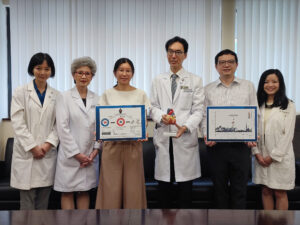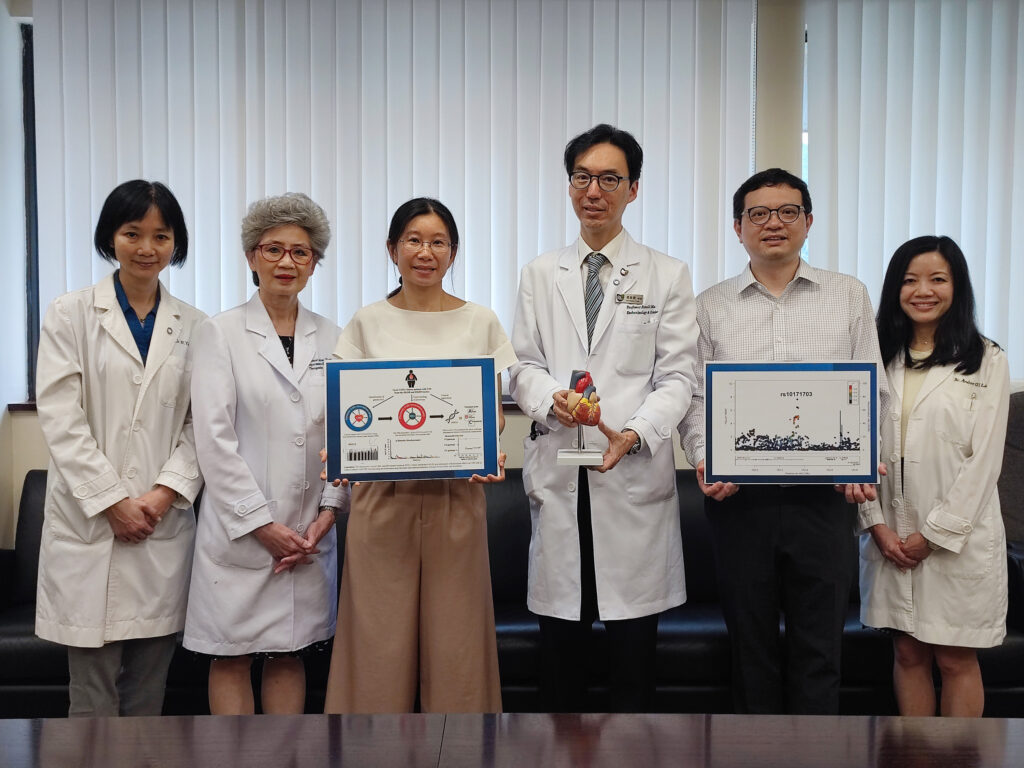CUHK
News Centre
CUHK identifies a new genetic marker to predict heart disease risk in people with diabetes Study finding highlights the potential of precision medicine in diabetes
Researchers from The Chinese University of Hong Kong (CUHK)’s Faculty of Medicine (CU Medicine) have identified a new genetic marker for heart disease in patients with diabetes. This finding can help improve future risk prediction as well as individualise treatment for patients with diabetes. The results have been published in the leading diabetes journal Diabetes Care in June.
Patients with diabetes have a two to three times increased risk of coronary heart disease
According to the population health survey 2020-22 by the Department of Health, the total prevalence of diabetes among the population aged 15 or above in Hong Kong was 8.5%. Patients with diabetes have a two to three times increased risk of incident coronary heart disease compared with individuals without diabetes.
Professor Ronald Ma, S.H. Ho Professor of Diabetes and Head (Academic Affairs) of the Division of Endocrinology and Diabetes at CU medicine, and Principal Investigator of the Hong Kong Diabetes Biobank, noted, “Coronary heart disease (CHD) remains a major cause of hospitalisation and ill health among our patients with diabetes, and this increased risk of CHD in diabetes persists even after consideration of conventional risk factors. In this latest study, we have identified a new genetic marker that will identify those at risk for more personalised treatment, providing a basis for precision medicine in diabetes.”
New genetic marker associates with elevated blood pressure and heart disease
The CU Medicine research team compared the patterns of variations in more than 6 million genetic markers in each of the 3,596 patients with diabetes and coronary heart disease and those of 8,898 patients with diabetes for at least 10 years but no heart disease. All were from Hong Kong. This detailed analysis was supplemented by analyses of data from more than half a million people from around the world. In one of the largest studies of its kind, CU Medicine researchers have identified a new genetic marker “PDE1A rs10171703” for heart disease risk in Chinese people with diabetes. Carriers of the risk variant at this marker had a 20% increased risk of heart disease and cardiovascular disease than non-carriers among patients with type 2 diabetes.
Dr. Claudia Tam, Research Associate of the Division of Endocrinology and Diabetes, Department of Medicine and Therapeutics at CU Medicine, remarked: “The genetic marker that we identified was also associated with elevated blood pressure. This finding highlights the close link between blood pressure and heart disease risk, and explains why people who carry the risk marker have increased risk of heart disease.”
Professor Juliana Chan, Chair Professor of Medicine and Therapeutics at CU Medicine and Founding Director of the Hong Kong Institute of Diabetes and Obesity, remarked, “Patients who carry the genetic risk marker may potentially derive the greatest benefit from intervention, with around 40% reduction in the risk by controlling blood pressure. The use of these genetic markers can inform both patients and providers to optimise blood pressure for reducing the risk of heart disease along with control of other risk factors.”
Study highlights the potential of genomic medicine for patients with diabetes
Dr. Cadmon Lim, Scientific Officer of the Division of Endocrinology and Diabetes, Department of Medicine and Therapeutics at CU Medicine, noted “There is increasing interest in precision medicine. Our study findings highlight the important role of genetics in affecting an individual’s risk of heart disease.”
“Our study highlights the potential of genomic medicine, where genetic information can provide new insights on disease risk and mechanisms, and the information can be used to guide future treatment. We would like to express our sincere appreciation of the support from the granting agencies, especially the Research Grants Council Theme-based Research Scheme and Research Impact Fund, which have made these large-scale research efforts possible. We would also like to thank the patients who participated in the study,” Professor Ma added.
The study was primarily supported by the Research Grants Council Theme-based Research Scheme, and the Research Impact Fund, with additional support from several other funding sources.
The study’s DOI is https://doi.org/10.2337/dc22-2331

Researchers of CU Medicine have identified a new genetic marker “PDE1A rs10171703” for heart disease in patients with diabetes. Carriers of the risk variant at this marker had a 20% increased risk of heart disease and cardiovascular disease than non-carriers among patients with type 2 diabetes. The finding can help improve future risk prediction as well as individualise treatment for patients with diabetes.
(From left) Clinical Associate Professor (honorary) Dr. So Wing-yee, Chair Professor of Medicine and Therapeutics Professor Juliana Chan, Research Associate Dr. Claudia Tam, S.H. Ho Professor of Diabetes Professor Ronald Ma, Scientific Officer Dr. Cadmon Lim and Professor Andrea Luk, from the Division of Endocrinology and Diabetes, Department of Medicine and Therapeutics at CU Medicine.




